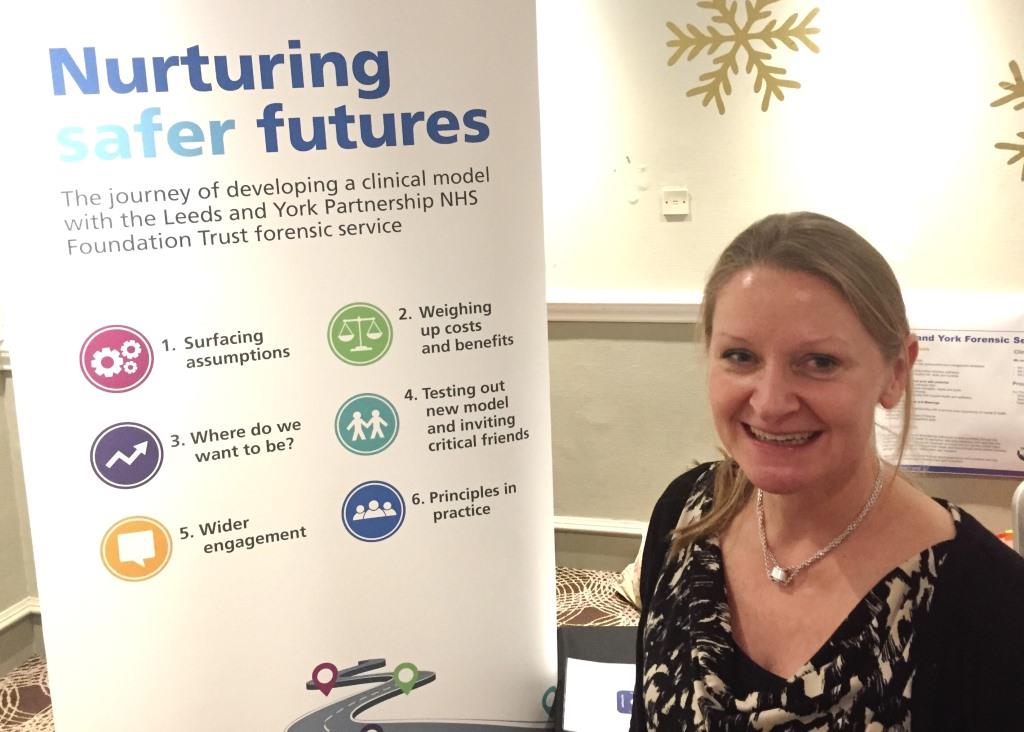Improving quality of care in Leeds and York Forensic Services
Leeds and York Forensic Services are delighted to have received a ‘good’ rating in the recent Care Quality Commission (CQC) inspection demonstrating the improvements in quality they have put in place over the past few years.
The development of a new clinical model is part of a quality improvement journey that the service have taken since November 2016, when the CQC gave them a ‘requires improvement’ rating in the safe and effective domains. This happened around the same time as a Ward Closure at Clifton House and a serious incident at The Newsam Centre, with the service experiencing high levels of staff sickness and turnover, low levels of morale and difficulties recruiting.
An external review was commissioned and reported back in April 2017, which yielded 24 recommendations. It’s from that point that positive change started to take hold.
The process of clinical model development has been fundamental to the subsequent turnaround and optimism with which the service now views its potential.

Steven Dilks (pictured), Head of Operations for Forensic Services, said: “The service has seen some real improvements in the quality and effectiveness of the care we deliver and this was recognised through our recent CQC inspection with the services being rated as ‘good’ in all domains. Our clinical model and a focus on working with an individual’s trauma has been a fundamental part of our improvement work; helping us develop into a service that is more reflective, supportive of team development, having a greater sense of a shared approach and influencing how we work with service users.”
Sharing the results of the team’s work
Colleagues in the service have recently had a paper published in The International Institute of Organisational Psychological Medicine (IIOPM) Journal describing the work that has been undertaken to create, embed and sustain a trauma informed clinical model in the service in order to improve the quality of care for service users.
Our Trust provides low secure adult inpatient mental health services at Clifton House in York and The Newsam Centre in Leeds, as well as services in the community and a court assessment and probation liaison service. Service users may be referred from a range of pathways, including from prison settings and medium secure, community or inpatient working age adult services.
Our expert team of nurses, psychiatrists, psychologists, pharmacists and occupational therapists work together to provide high quality care to patients with complex conditions and challenging behaviours.

Dr Kerry Hinsby (pictured), Lead Consultant Clinical and Forensic Psychologist, said: “It is really rewarding to see a summary of our work in print. The article details an 18 month process of working with an organisational development consultant to embed a sustainable and effective clinical model. The aim of writing up the methodology was to share the experience of working in an exciting and innovative way. Since publication, it has already generated quite a lot of interest.”
What is trauma informed care?
Trauma informed care creates conditions that reduce harm and promote healing, especially in individuals who have already experienced trauma. It recognises that experiencing trauma in the past can affect the ways a person perceives and responds to their environment in the present.
Aspects of a situation that may seem benign to someone with no history of trauma can trigger overwhelming feelings of distress in a trauma survivor, leading the individual to behave in ways that might be labelled as, for example, ‘oppositional’, ‘non-compliant’, ‘delinquent’ or ‘hostile’. If an organisation reacts to these behaviours with seclusion, exclusion, restraint or force, further trauma may result.
Working within a trauma informed care model helps to understand more about the service users’ individual care needs; ‘what has happened to them’, ‘what have been their personal experiences,’ and thus helps foster a therapeutic relationship that is focussed on empowerment and a culture of safety.
Why is this approach particularly important for our forensic service users?
Dr Hinsby comments “Research consistently tells us that people using mental health services have experienced high rates of trauma in their childhoods and adulthood. A survey of our service users in the forensic service told us this rate was almost 100% – through family stressors, abuse and neglect; through substance misuse and negative social networks and even through accessing care and criminal justice systems in early years. Taking a trauma informed approach allows the service to acknowledge and understand this high prevalence and the impact. Through the lens of Trauma Informed Care we can incorporate the knowledge into our practice and service to create environments and relationships that promote recovery. Importantly, we are also better equipped to provide the specific support to our staff who are working with high levels of trauma on a regular basis.”
This creates a virtuous circle of providing consistent quality care to service users helping individuals move towards a place of less dependency on services and increased self-management.
Embedding a trauma informed clinical model
An invitation was offered to the whole service for diverse staff to contribute to the process which involved participation in a series of workshops followed up with sharing, testing and refining that learning in everyday interactions with colleagues in the wider service.
The aim was to create a clinical model that was structured enough to provide consistency but flexible enough for professional and individual differences and ward variations:
- Owned by the service and different professional and staff groups
- Evidence based and meaningful
- Administratively efficient, with no extra work requirements
- Consistent with the service vision
- Empowering for staff
- Operating within existing structures (e.g. Mental Health Act)
New connections between groups and individuals began forming and new patterns of relating and talking were beginning to arise. There was a sense that something novel was possible and the foundations for thinking differently were ready. The old patterns in the service were collapsing and the system felt ready for something new.
There was deliberately no launch date, no mass training, and no change of paper work. Instead the focus has been on connecting and ensuring the model runs through the heart of everything the service does. The emphasis has been on experiential rather than classroom based learning.
The focus of work has now shifted from the leadership community to frontline staff and service users, with an emphasis on co-creating different ways of working and how to embed service principles into everyday care delivery. For example, via the recovery college staff and service users have developed a leaflet to help explain the model and the expectations of care to new staff and service users.
Dr Hinsby: “Key principles of trauma informed care include transparency, trust and collaboration. By co-designing a leaflet about our clinical model we intended to make important steps within these principles. Co-design ultimately allowed the information to be presented in an engaging and meaningful way for service users. But more importantly the process of staff and service users working together allowed conversations about trauma to naturally emerge and be discussed whilst instilling the values and knowledge of the model.”
In keeping with the principles of the journey, there is no endpoint in mind – change is a process which takes time. Evaluation is key to ensure that the service assesses and responds to the impact of implementation. To this end they are in the second cycle of administering a co-created patient experience questionnaire and undertaking activity to evaluate staff wellbeing. With the support of the Clinical Effectiveness Team the service has submitted a research proposal to the Trust organised “Dragon’s Den” with the hope of gaining academic support for this process.
Andrea Arundel, Quality Improvement Lead, said: “I would like to say a massive congratulations to all involved in writing this paper. It is an extremely exciting next step for our profile as a service and promotes the excellent work that is taking place.”
Paper for The IIOPM Journal written by:
- Kerry Hinsby, Consultant Clinical and Forensic Psychologist
- Anthony Owens, Organisational Development Consultant
- Jane Ellis, Assistant Psychologist
- Claire Layton, Nurse Matron
The IIOPM Journal is devoted to promoting positive mental health, research and awareness in the field of Organisational Psychological Medicine.
You can read the IIOPM article here.
You can find out more about our Leeds and York Forensic Services on our website.